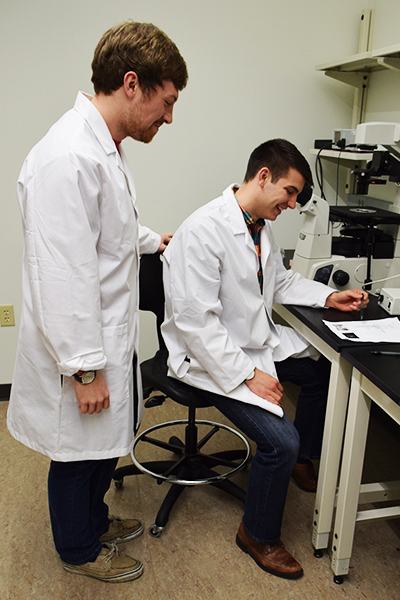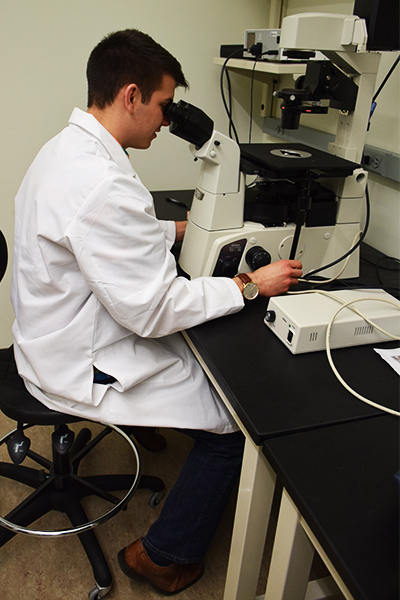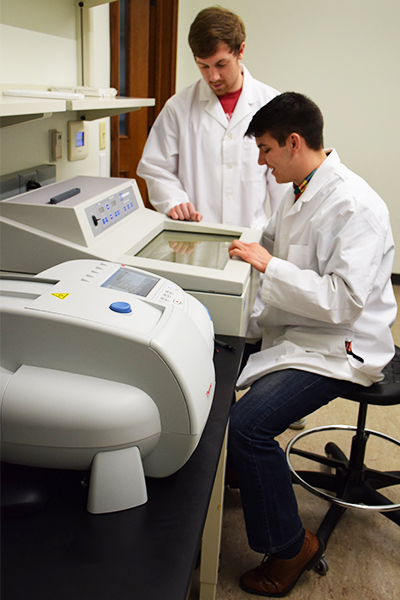Seth Washispack, a class of 2016 graduate of the biomedical engineering program here at the University of Arkansas, was recently named a “Razorback Classic” by the University. Below, he offers 10 tips on how to succeed as an undergraduate engineering student here at the U. of A.:
1. Take your sophomore year to find out what you want out of life. Yes, involving yourself in extracurriculars is wise, and I highly suggest it, but you will do a much better job if you have a goal in mind to drive your whole being.
- I became involved with activities my freshman year and continued at an alarming rate. By the time I was a sophomore, I was doing two research projects (badly), teaching an SI (a ten hour commitment), learning gymnastics (another ten hour commitment), and studying for school. Overloaded and sleep deprived, I learned that I can either do many things poorly or a few things well. Even with this knowledge, it was not until my senior year when I began to make hard decisions about my involvement in so many things. My greatest regret from this experience is not being able to give myself fully to the activities I was involved. Yes, I helped grow the clubs I belonged to, but a greater focus could have helped me transform these organizations to change not only the campus but the community.
- Ailon is a good example. She was not heavily involved in any biomedical engineering RSOs until Engineering World Health (EWH) started. When she became involved, she gave her all to the organization. In one year, Ailon built EWH into an organization known for the involvement of all the members. There are several successful committees to engage the members, and they are making a difference on campus and in the community. They are even making strides to impact the world by sending supplies to third world countries.
2. Don’t be afraid to meet new people. You can go up to someone and just say, “Hello.” Introduce yourself and begin asking questions. These can range from asking about someone’s career to their favorite food. Mix these up—it shows you care about the person holistically instead of just about what the person can do for you.
- During my freshman year, I learned the typical college questions: “Where are you from?”, “What is your major?”, “What do you want to do?”, etc. By asking these first few questions, I was trying to define the person. I did not want a newfound acquaintance to think these things were all that there was to her. At this point, I began asking much more obscure questions to give me a better understanding of the person outside of college. Now I have my own infamous questions: “What is your favorite candy bar?”, “What is your favorite meal and meal time (breakfast, lunch, dinner, 10:00pm)?”, “Do you have any siblings?” Through these questions, I can help relieve the anxiety many people feel when asked questions about their (often uncertain) future.
3. Be thankful. The humility of a person is measured not by putting himself down but by the gratitude he expresses. As an author once explained, humility is the “freedom of self-forgetfulness.” Ask yourself these questions deeply: “At the root, is there anything I deserve? What wasn’t given to me in the beginning?”
- Throughout my upperclassman years, I have asked myself the question, “What is true humility?” Before, I associated the rejection of compliments with humility, but I realized this was not the case. As I studied humble people, I found it was not the rejection of compliments, but the acceptance of compliments while giving credit for those who give you these abilities. Humility is focusing on others instead of yourself. The false humility I described before does not match this explanation. The rejection of compliments continues to place the focus on yourself. Timothy Keller’s The Freedom of Self-Forgetfulness helped me learn this.
- Note: this is not easy. I am still learning to do this, and it is difficult at first to change the programmed response, “No I’m not that smart, well dressed, funny, etc.” When you accept compliments, your gratefulness immediately needs to follow, otherwise others may find you prideful.
4. Be bold and try out things you enjoy. Regret is a difficult emotion to overcome. Pursuing extracurricular activities unrelated to school can help you relax after a long week and gives you the opportunity to meet new people you could have never met before.
- My freshman and sophomore year, I joined a competitive gymnastics team, which gave me an outlet to relax and exercise. In the beginning, I joined a recreational team composed of kids ages nine and under. I was two to three times as big as these kids. Even after I moved to a competitive team, I was the oldest guy by four years. Yet through these experiences, I made new friends and even worked at a clinic owned by the dad of one of my teammates.
- Cassie Walker, one of my fellow BME students, is another great example because she took up dance again during her college years. She now teaches classes to younger girls and enjoys helping the girls. This experience helps her stand out in interviews as it exemplifies her ability to explain complex movements to young kids.
5. Take life one step at a time. I usually become overwhelmed when I think about everything that needs to be done. Think of the first thing to be done and finish it. Accomplishing small goals will help shrink the magnitude of the tasks ahead of you.
6. Make a priority list. Start your day by making a list of everything that needs to be done, and arrange tasks from most time-sensitive to least.
- This semester I challenged a friend to do this. I decided to join him to keep him accountable. I found it to be so beneficial that I now make one everyday. Before I start my work for the day, I will take ten to fifteen minutes to think about what needs to be done. This can range from finishing a scholarship application, emailing a professor, or texting a friend. This has helped me from forgetting important things.
7. Read consistently, and with variety. Find a time to read a book everyday. It could be for learning a new skill or for fun. Reading stimulates your brain and increases your vocabulary. Also, it gives you greater insight into the world.
- I made a goal for myself to read three books a month. I realized quickly that this would be impossible unless I worked on it one day at a time. For thirty minutes before I write my priority list, I read. In the past month, I have listened to the audio book Elon Musk: Tesla, SpaceX, and the Quest for a Fantastic Future, read The Immortal Life of Henrietta Lacks, read Orthodoxy, and am currently finishing War at the Top of the World. The variety of my reading allows me to understand and connect with others.
8. Stay healthy through good eating habits and exercise. Make exercise a priority. When you exercise in the morning, you will have more energy throughout the day. If you think of eating as a long term commitment, you will chose to eat fruit over chocolate because you know you will feel much better later in the day. If you have to chose between eating well and exercising, chose eating well. This will make a greater difference than exercise.
- My senior year I moved off campus. I chose not to have a meal plan, but I wanted to be healthy and save money. Because of this, I cook 95% of my meals. Only once or twice a month do I eat out. Working out does not have to be in the gym. I end up doing bodyweight workouts at home. Think of what makes you active and do more of it. It could be rock climbing, dancing, or gymnastics (this is what I did my freshman and sophomore year.).
9. Start looking for internships and Research Experience for Undergraduates (REUs) early. There are some programs who specifically want underclassmen, so try to apply as a freshman or sophomore! Learn from the experiences below:
- I applied for an REU from the University of Texas at Austin for the summer of my junior year. While I was applying, I learned that the program preferred sophomore and freshmen students, and when I didn’t get the REU I was frustrated that I hadn’t applied earlier.
- A friend of mine did an REU during the summer of her junior year. They told her they would take her back the next summer. The problem was that she was graduating the next summer, so she couldn’t accept the offer!
10. Take honors economics. Economics helps explain supply and demand. After taking the class, you will have a better understanding of what is driving the changes in prices all around you.
- This semester (second semester senior year) I am taking my last social science course. I asked my sister what social science I should take to help me with my MBA. She suggested microeconomics with Dr. Stapp. While taking his class, I began to understand why some companies such as Apple and Tesla exist. If you do take Dr. Stapp’s microeconomics class, I would suggestion reading Elon Musk (book suggested above).




